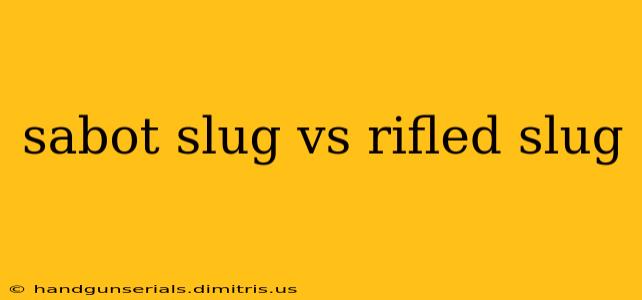Choosing the right shotgun slug can significantly impact accuracy and effectiveness, especially in hunting or self-defense situations. Two prominent contenders often top the list: sabot slugs and rifled slugs. Understanding their differences is crucial for making an informed decision. This comprehensive guide delves into the mechanics, advantages, and disadvantages of each, helping you determine which slug best suits your needs.
Understanding the Fundamentals: Sabot Slugs
Sabot slugs are designed to utilize the smoothbore barrel of a shotgun effectively. The slug itself is a relatively small, typically cylindrical projectile, encased within a plastic or composite sabot (a kind of aerodynamic "sleeve"). This sabot expands upon firing, engaging the rifling in the shotgun barrel. The result? A surprisingly accurate shot, despite the smoothbore design.
Advantages of Sabot Slugs:
- Accuracy: Sabot slugs, while fired from a smoothbore, achieve impressive accuracy at longer ranges compared to standard foster slugs. The sabot's design aids in stabilization, mimicking the effects of rifling.
- Reduced Recoil: Due to the lighter projectile weight, recoil is often less than with heavier rifled slugs. This translates to improved shooter comfort and potentially faster follow-up shots.
- Cost-Effective: Sabot slugs tend to be more affordable than rifled slugs, making them a budget-friendly option.
Disadvantages of Sabot Slugs:
- Range Limitations: While more accurate than standard slugs, sabot slugs may still suffer from accuracy degradation at extremely long ranges compared to slugs fired from rifled barrels.
- Sensitivity to Barrel Condition: Performance can be affected by imperfections or obstructions within the shotgun barrel. A clean, well-maintained barrel is critical for optimal accuracy.
- Potential for Sabot Separation: In rare cases, the sabot might separate from the slug before reaching the target, impacting accuracy and potentially causing damage to the barrel.
Rifled Slugs: The Power of Rifling
Rifled slugs are designed for shotguns with rifled barrels. These slugs have grooves machined directly into their bodies, allowing them to spin and stabilize in flight. This inherent spin provides superior accuracy and range. Note that rifled slugs should not be fired from a smoothbore shotgun; doing so can result in significant barrel damage.
Advantages of Rifled Slugs:
- Exceptional Accuracy and Range: Rifled slugs deliver unmatched accuracy and extended range compared to sabot or foster slugs, making them a preferred choice for long-distance shots.
- Consistent Performance: Their design inherently provides consistent accuracy regardless of barrel condition, eliminating much of the variability associated with sabot slugs.
- Penetration Power: The design often leads to greater penetration capabilities, especially useful in hunting larger game.
Disadvantages of Rifled Slugs:
- Higher Recoil: The heavier weight of rifled slugs typically results in higher recoil compared to sabot slugs, potentially affecting shooter comfort and follow-up shot speed.
- Requires a Rifled Barrel: This limits the compatibility of rifled slugs, as they cannot be used in standard smoothbore shotguns. A rifled barrel is an essential prerequisite.
- Higher Cost: Rifled slugs are often more expensive than sabot slugs.
The Verdict: Choosing the Right Slug
The "best" slug depends entirely on your specific needs and shooting conditions.
- For accuracy at moderate ranges and budget-consciousness: Sabot slugs are a solid choice.
- For maximum accuracy, extended range, and hunting larger game: Rifled slugs and a rifled barrel are preferable. The enhanced accuracy and penetration are worth the higher cost and recoil for many hunters.
- For self-defense situations: Consider the range and conditions you are most likely to face. A shorter range engagement might favor a sabot slug's lighter recoil, enabling quicker follow-up shots, while longer ranges would benefit from a rifled slug's accuracy.
Ultimately, the choice between a sabot slug and a rifled slug comes down to a careful consideration of your priorities, your firearm's capabilities, and the shooting scenario. Thorough practice with whichever slug you choose is essential for achieving optimal performance and safety.

